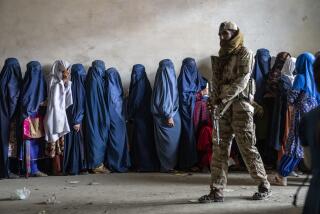Some backbone at the U.N.
Something odd happened Friday in Geneva: The United Nations Human Rights Council, derided by conservatives and liberal human rights advocates alike as a toothless and sometimes hypocritical organ, actually did the right thing. For the first time ever, it voted to expel one of its members for committing atrocities.
That member was Libya, whose tyrannical leader, Moammar Kadafi, has reportedly ordered soldiers and armed mercenaries to slaughter those protesting his regime. The decision on Libya’s suspension now goes to the General Assembly. Regardless of what happens next, the unanimous vote by the much-maligned Human Rights Council is a sign that it might be more worthwhile than its critics suppose.
The current council was created in 2006 to replace the widely discredited Human Rights Commission, a farcical organization whose 53 members included some of the worst human rights abusers in the world; as then-U.N. Secretary General Kofi Annan observed, countries sought membership “not to strengthen human rights but to protect themselves against criticism or to criticize others.” Not satisfied with the reforms, the George W. Bush administration withdrew from the council, but the Obama administration rejoined in 2009.
We thought that was the right decision, but not because we had any illusions about the council’s agenda or effectiveness. It was still a bastion of bad behavior, stacked with repressive regimes such as Libya, Cuba, Saudi Arabia and China. Just like the old commission, it continued to focus on perceived abuses by Israel against Palestinians while taking little action elsewhere. But we believed the U.S. could have more influence over the building of a better council by working within it than from without. And, in fact, over the last four years it has become clear that the council does represent an improvement over the old commission, if not as big an improvement as we’d like.
Perhaps its most valuable contribution is the “universal periodic review,” in which the human rights records of all 192 U.N. member states are opened to scrutiny. The council has little power to follow up on these reviews or to take much action, but shining a spotlight on repression does embarrass dictatorial regimes and in some cases has prompted changes. Following its review, Saudi Arabia promised to abolish the guardianship system, in which male permission is required for women to work, study, marry, travel or use public services, and to end the death penalty for juveniles.
By voting to expel Libya, the council has demonstrated that it is capable of fulfilling its mandate to suspend countries that commit “gross and systematic violations of human rights.” Obviously, we would have been happier if Libya had never been allowed to join. But when it comes to improving U.N. institutions, it’s all about baby steps.
More to Read
A cure for the common opinion
Get thought-provoking perspectives with our weekly newsletter.
You may occasionally receive promotional content from the Los Angeles Times.






